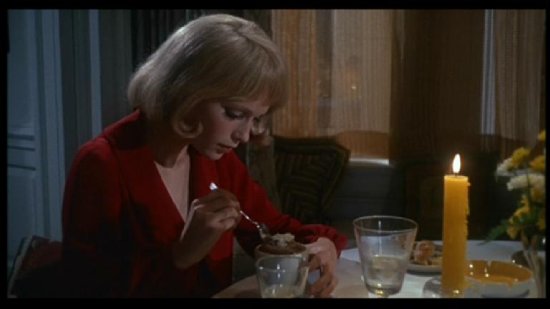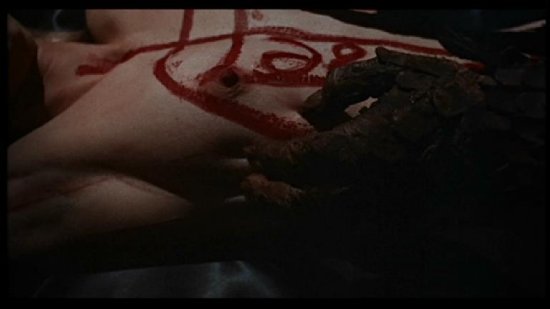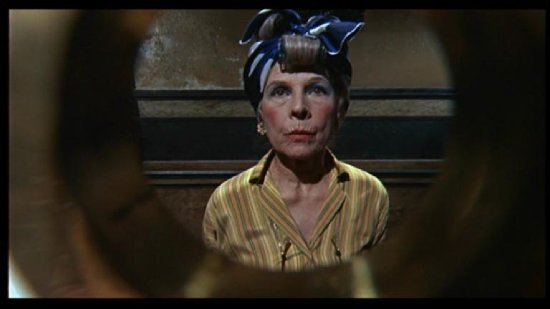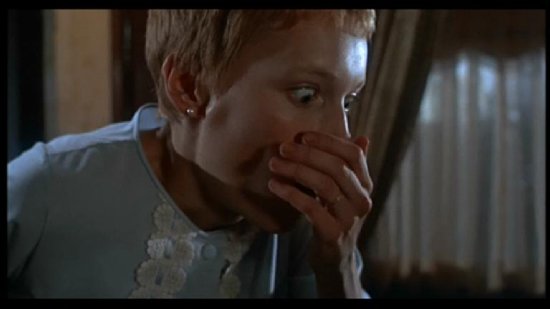Rosemary's Baby
In the mid-1960s renowned producer Robert Evans wanted to make a big screen adaptation of Ira Levin's pulp novel Rosemary's Baby. With producer William Castle Paramount acquired the rights and Castle wanted to direct. This ambition met with resistance from Evans as, fine a producer as Castle may be, he was a bit of a schlock director, keen on gimmicks and not an art director that Evans thought necessary to make the novel into a respectable film. Approaching Roman Polanski, who was virtually unheard of in America but very well thought of in Europe, particularly because of Repulsion, Evans agreed to let the auteur make the film as he saw it, writing the screen play himself and choosing his own crew, particularly the production designer Richard Sylbert.
Casting the little known TV actress Mia Farrow as Rosemary and John Cassavetes as her new husband, Guy, ensured a mix of experience and naïveté which, when mixed with Ruth Gordon, Sidney Blackmer and Ralph Bellamy led to a cast of unknowns and respected screen and theatre actors.
Rosemary and Guy Woodhouse are newcomers to New York and are looking for apartments, with Rosemary falling in love with the Bramford where there is a large apartment with a sizeable living room and enough space to make a nursery as they intend to start a family. Meeting with Rosemary's family friend, Hutch, who regales them with stories of the Trench Sisters who cooked and ate children and other rumours of occult behaviour including witchcraft, doesn't put them off and, as soon as they move in Rosemary begins decorating.
Just as in the novel, you hear their next door neighbours before you see them and they are even sounds of a gathering with strange chanting and pipe music. When they do meet the Castevets, Roman and Minnie, they find them to be a charming couple with Roman's composure and worldly-wise demeanour almost offsetting Minnie's dottiness. At a dinner Roman's tales of his travels charms Guy who strikes up an instant friendship with him but Rosemary is less sure and finds Minnie's interest in her to be annoying, particularly when she settles for a quiet afternoon in with a record and a book only to find that Minnie calls round with her friend Laura-Louise.
Keen to start a family, Rosemary and Guy settle down for a quiet meal to coincide with one of the two best 'baby nights' and when there is a knock on the door and she hears Minnie's voice, Rosemary fears the whole thing would be ruined. However, the old lady only wanted to bring them dessert, a chocolate mousse (which she amusingly pronounces 'mouse'). Rosemary finds it to have a chalky undertaste but her concerns are dismissed by Guy who says it's delicious and, after scooping most of it into her napkin and disposing of the offending pudding, Rosemary collapses and has a vivid dream of time on a boat and being raped by something that wasn't human.
Discovering she's pregnant, Rosemary begins preparing for motherhood whilst Guy enjoys his newfound success which came when the actor he was understudying mysteriously went blind. Under the care of respected obstetrician, Dr Abe Sapirstein, who the Castevets recommended and persuaded to take Rosemary as a patient without charging his expensive society rates, she has a strange pregnancy where she loses weight and experiences a terrible pain - both dismissed as normal by Dr. Sapirstein. As the pregnancy progresses, Rosemary begins to suspect that her neighbours are Satanists due to a book that Hutch gives to her which appears to identify Roman as the son of notorious Satanist Adrian Marcato. The question is: is she really the target of a coven of witches or suffering from pre-partum depression and imagining the whole thing?
Rosemary's Baby was one of the first films I watched when I first got into horror and it has remained a favourite of mine for well over a decade. Mia Farrow is wonderful and Polanski's direction is intelligent and claustrophobic; the whole story is told through Rosemary's eyes and so we are not privy to what may be going on, keeping the whole 'is it a dream or a terrifying conspiracy?' aspect of the narrative a secret until the dramatic final act. The film is so carefully constructed and executed that the horror is palpable without ever being seen or shown with everything alluded to and kept as a waking nightmare. Even when the film reaches the ending, Polanski resists the urge to show what Levin describes in the novel and we see it all through Rosemary's reaction - no further embellishment is necessary and would only deflect from the impact of her holding her hand to her face in a silent scream.
The Disc
Extra Features
The retrospective interviews with Roman Polanski, Robert Evans and Richard Sylbert are interesting as they cover all the bases from inception to filming. Each speaks well about the project and imparts quite a lot of revealing information. With no commentary on the disc, this does pretty well as a replacement despite running for only 17 minutes.
There is also a 22 minute series of interview answers from Polanski and Mia Farrow which are well edited together and run over footage from the shoot. The topics covered are quite wide ranging and make for a decent listen.
The Picture
Though a little soft with some grain evident, Rosemary's Baby is such a wonderfully shot film that you can almost excuse the lack of a pristine transfer. Polanski is such a master when it comes to the visuals that every shot shows signs of careful planning and a great collaboration between him and cinematographer William Fraker.
Richard Sylbert did a fantastic job with the production design and the Dakota Building is almost another character in the film - it's a strange historical fact that John Lennon was shot outside the very same building. Adding to all this are the great costumes and set decoration.
The Sound
This is not an effects driven film so the mono sound track works perfectly well in presenting the dialogue clearly and complementing the visuals with a terrific score by Christopher Komeda. I don't know how, but the use of Beethoven's Für Elise adds to the sense of unease and tension despite being a piece of music that should really do the opposite.
There are a good set of subtitles available plus an optional German soundtrack which just sounds very wrong!
Final Thoughts
Rosemary's Baby is one of the most elegantly shot and classy of horror films, completely the opposite of something like The Texas Chain Saw Massacre, but somehow equally disquieting and unsettling. It isn't an outright assault on the senses nor are there jumps and bucket loads of blood as it works on a different level with the ambiguous ending more disturbing than that in the book.
This is one of the few examples in the horror genre where high art meets popular entertainment and the film was extremely successful at the box office and critically, with Ruth Gordon well deserving of her Academy Award; the film spawned a host of religious-based horror films which reached their zenith in 1973 with The Exorcist, each having their own imitations that failed to reach the heights of the original films.
This is a film that I like very much and can enjoy and appreciate as much as TCSM, The Exorcist and The Evil Dead - all very different and all great horror films in their own right. Rosemary's Baby is a film fully deserving of a terrific Blu-ray release which I hope it receives but, until then, this disc is a must for any self-respecting horror fan.




Your Opinions and Comments
Be the first to post a comment!